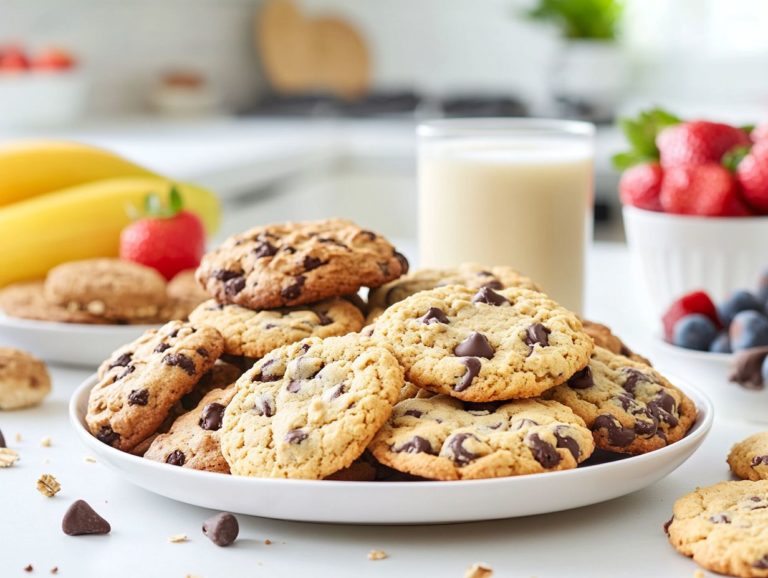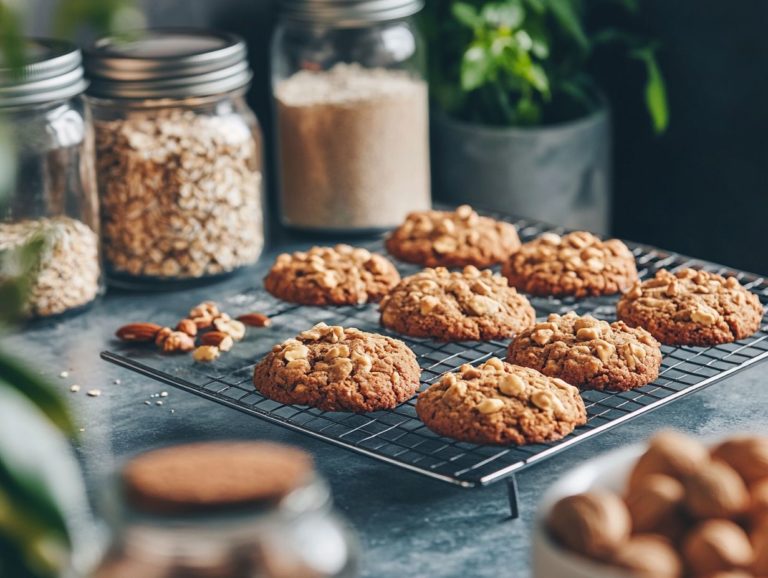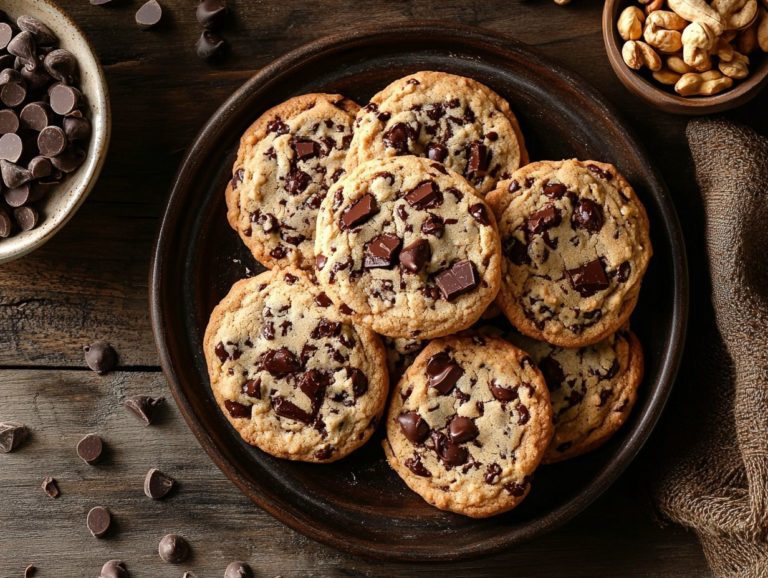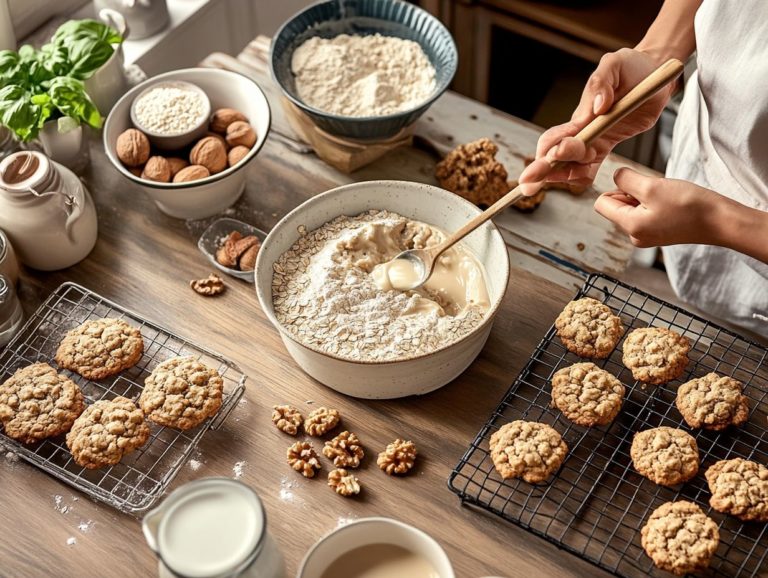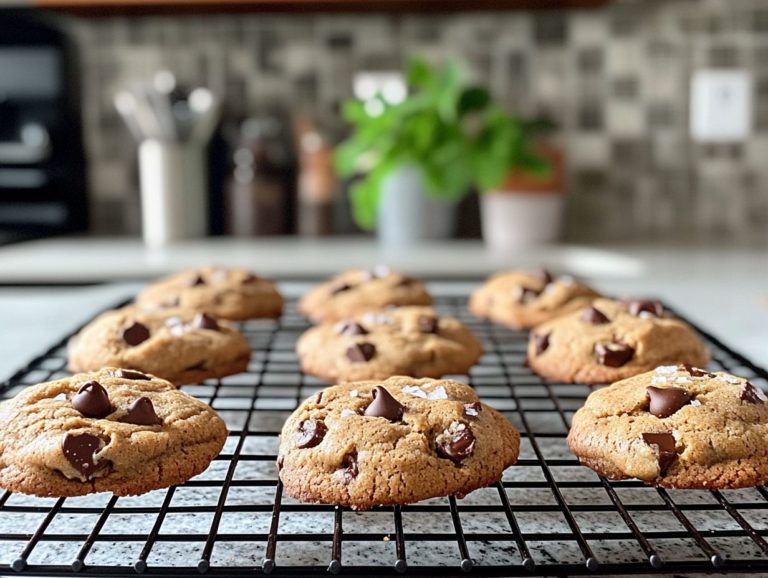How to Make Plant-Based Cookies for Special Diets
Are you eager to satisfy your sweet tooth with delicious cookies without sacrificing your health or values?
Plant-based cookies present a delightful solution, brimming with health benefits and a smaller environmental impact.
No matter if you’re dealing with dietary restrictions such as vegan, gluten-free, paleo, or dairy-free, there’s a cookie recipe tailored just for you.
This article delves into the perks of plant-based treats, offers tips for crafting them in the comfort of your home, and shares mouthwatering recipes that cater to diverse dietary needs, including vegan chocolate chip cookies and Everything Cookies.
Uncover how to indulge in healthy cookies without the guilt!
Contents
- Why Choose Plant-Based Cookies?
- What Are the Common Dietary Restrictions?
- 1. Vegan
- 2. Gluten-Free
- 3. Paleo
- How to Make Plant-Based Cookies for Special Diets
- Delicious Plant-Based Cookie Recipes for Special Diets
- 2. Gluten-Free Oatmeal Raisin Cookies
- 3. Paleo Almond Butter Cookies
- 4. Nut-Free Sunbutter Cookies
- 5. Dairy-Free Snickerdoodles
- Frequently Asked Questions
- What is a plant-based diet?
- Why should I make plant-based cookies for special diets?
- What are some common substitutes for ingredients in plant-based cookies?
- Are plant-based cookies suitable for people with gluten intolerance or celiac disease?
- Can I still achieve a desirable texture and flavor with plant-based cookies?
- Are there any plant-based cookie recipes that are easy to make for beginners?
Key Takeaways:
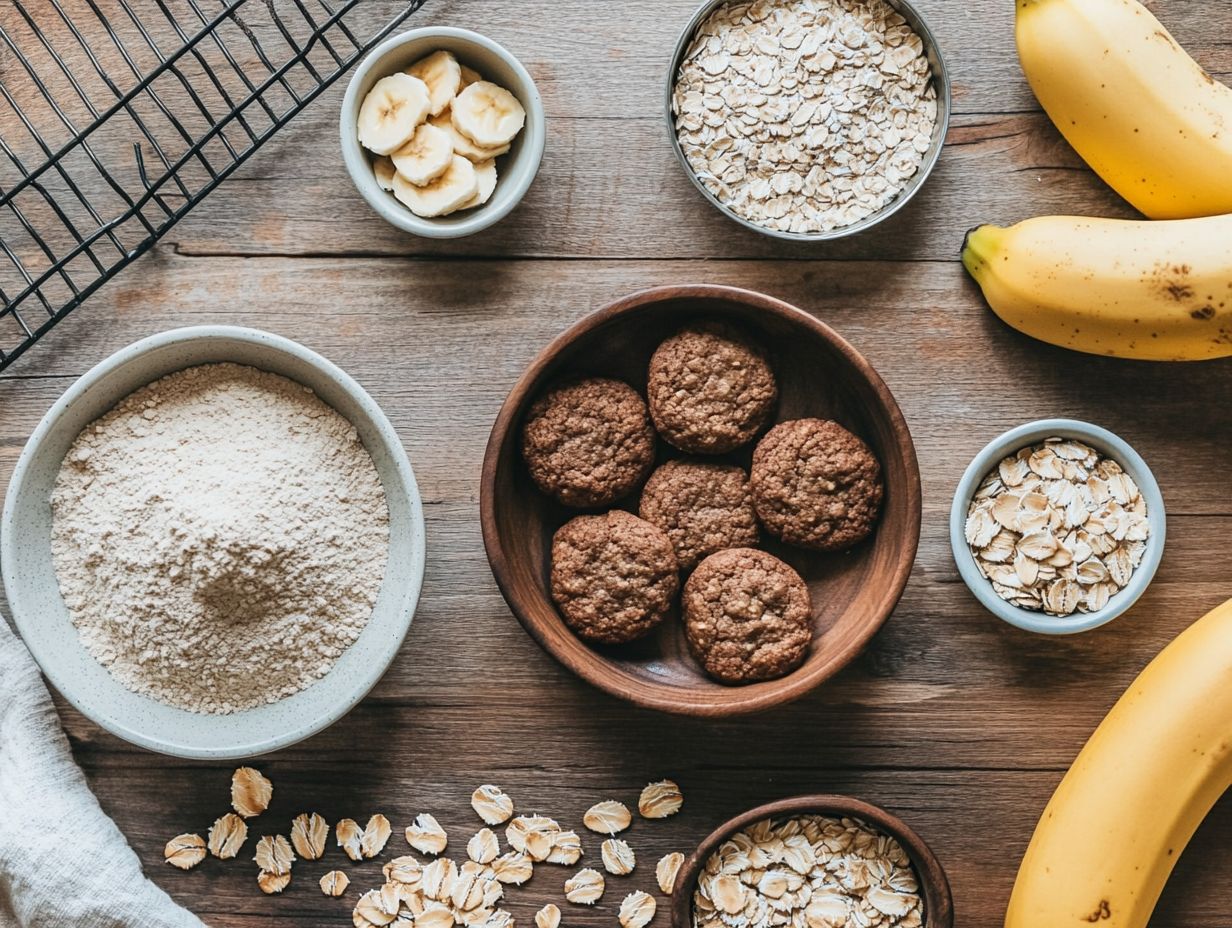
- Plant-based cookies offer health benefits and are environmentally friendly.
- Common dietary restrictions include vegan, gluten-free, paleo, nut-free, and dairy-free diets, all of which can be catered for with the right cookie recipes.
- When making plant-based cookies, choose the right ingredients, substitute when needed, and follow baking tips for best results.
Why Choose Plant-Based Cookies?
Opting for plant-based cookies transcends mere trendiness; it signifies a commitment to a healthier lifestyle rooted in whole food goodness. These cookies, crafted from ingredients like oats, almond meal, chocolate chips, and nut butter, offer a delightful alternative to traditional options.
With enticing variations such as Cowboy Cookies, Everything Cookies, and nutritious breakfast cookies, plant-based cookies accommodate diverse dietary needs without compromising on flavor or nutrition. By incorporating elements like gluten-free rolled oats and natural sweeteners such as banana and date sugar, you can amplify their health benefits, transforming them into an ideal sweet treat for any palate.
1. Health Benefits
The health benefits of plant-based cookies are truly remarkable, often featuring wholesome ingredients like oats, almond butter, and chocolate chips. These cookies offer a nutritious and satisfying treat that doubles as a healthy snack or dessert.
Using natural sweeteners and whole food ingredients ensures these cookies fit seamlessly into a healthy eating routine. Not only do these cookies delight your taste buds with their rich flavors, but they also provide an impressive energy boost, making them an excellent option whenever you need a pick-me-up during the day.
With lower sugar content compared to traditional cookies, they help you maintain stable blood sugar levels, minimizing those dreaded energy crashes.
The nutritional value of these treats, thanks to ingredients like flaxseeds, coconut oil, and cranberries, ensures that each bite delivers essential vitamins and minerals to your diet, promoting overall health. Therefore, choosing these cookies presents a delicious opportunity to incorporate more plant-based goodness into your daily routine.
2. Environmental Benefits
Choosing plant-based cookies offers significant environmental benefits, as adopting a diet rich in plant foods can effectively reduce your carbon footprint and lessen your reliance on animal agriculture, all while promoting sustainable ingredients and healthier eating habits.
Integrating plant-based cookies into your meal plan can make a meaningful impact on the environment. This shift helps conserve precious water resources, which are often overexploited in livestock farming, and minimizes greenhouse gas emissions.
In fact, studies reveal that plant-based diets can lead to a remarkable 50% reduction in emissions. By opting for gluten-free and organic ingredients, you further amplify these benefits. Organic farming practices reduce the need for synthetic pesticides and fertilizers, resulting in healthier ecosystems.
Research even suggests that gluten-free grains typically require less energy and water than their gluten-containing counterparts, making them a more sustainable choice. Therefore, incorporating plant-based cookies into your diet doesn’t just satisfy your sweet cravings; it also aligns with environmentally responsible practices.
Try baking these cookies today!
What Are the Common Dietary Restrictions?
In today s rich culinary tapestry, grasping common dietary restrictions is crucial for crafting inclusive and delightful treats, especially cookies. Many people adhere to specific dietary guidelines think vegan, gluten-free, paleo, nut-free, or dairy-free which means your cookie recipes need to accommodate these preferences.
By thoughtfully adapting traditional recipes, you can ensure that everyone gets to savor scrumptious cookies, whether they re in the mood for vegan chocolate chip cookies, oatmeal cookies, or gluten-free oatmeal cookies. Your treats can bring everyone together and create joy, allowing all to indulge without compromise.
1. Vegan
Vegan cookies are becoming increasingly popular, crafted without any animal products. This allows you to indulge in delightful treats like vegan chocolate chip cookies while staying true to a plant-based diet.
These scrumptious baked goods move away from traditional ingredients, providing a cruelty-free alternative that s both satisfying and often healthier. For example, you can easily swap out common animal-based components like eggs for flaxseed meal mixed with water or even mashed bananas, which serve as a natural binding agent. Dairy products such as milk can be replaced with delightful plant-based options like almond or oat milk, ensuring that these sweet creations remain irresistibly tasty without compromising on flavor.
Incorporating natural sweeteners and whole food ingredients improves taste and supports a wholesome lifestyle. This makes vegan cookies an enticing choice for everyone, whether you re a dedicated vegan or simply looking to cut back on animal products.
2. Gluten-Free
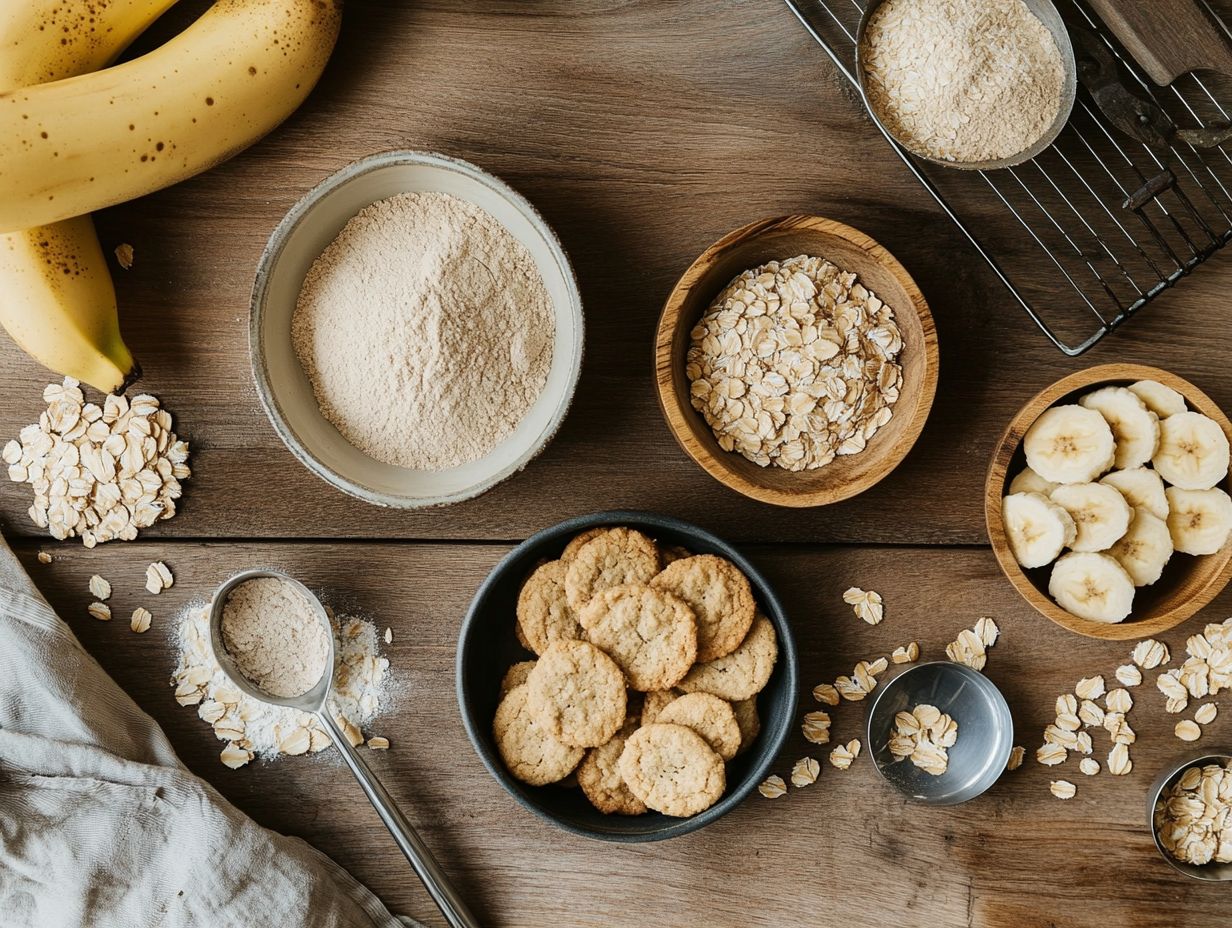
Gluten-free cookies present an exceptional option for those navigating celiac disease or gluten sensitivity. They create delicious cookies using alternatives such as gluten-free rolled oats and almond meal.
These cookies not only accommodate dietary restrictions but also unlock a diverse palette of flavors and textures, thanks to a variety of gluten-free flours like coconut, brown rice, and chickpea flour. By incorporating these unique ingredients, you can supercharge the nutritional value of your treats, transforming them into a rich source of fiber, essential vitamins, and minerals.
For a hint of sweetness, using raisins or dried fruit can add a satisfying chewiness to your cookies. Venturing into the realm of nut butters, seeds, and natural sweeteners can further enhance your cookies, ensuring they are not just safe to eat but also irresistibly wholesome. When you experiment with the right blend of ingredients, such as adding flaxseed or chocolate baking chunks, you re likely to achieve mouthwatering results that will satisfy everyone, regardless of their dietary preferences.
3. Paleo
Paleo cookies perfectly embody the principles of the paleo diet, incorporating ingredients like almond meal, nut butter, and natural sweeteners. This makes them an exceptional choice for anyone seeking a grain-free dessert option.
This dietary approach promotes the consumption of whole, unprocessed foods that mirror what our ancestors might have enjoyed. By swapping out traditional flour for almond meal or coconut flour, these cookies not only become gluten-free but also pack a punch with healthy fats and proteins.
The use of natural sweeteners like honey or maple syrup ensures a delightful sweetness without refined sugars. Consequently, these treats satisfy your sweet cravings while offering a more nutrient-dense alternative that can help maintain stable energy levels and support your overall health.
4. Nut-Free
Nut-free cookies present a safe and delightful alternative for anyone with nut allergies, using ingredients like sunflower seed butter to whip up irresistible treats such as sunbutter cookies.
These cookies not only cater to those with dietary restrictions but also entice a wider audience searching for healthier indulgences. Don t worry! Substituting nut-based ingredients opens a world of delicious possibilities! For example, using pumpkin seeds can add both texture and a pleasing flavor.
Coconut flour or oats deliver the essential bulk and moisture that every cookie needs. With the right baking techniques and ingredients, nut-free cookies can be equally delightful and nutritious.
By highlighting the simplicity of crafting these nut-free cookies, you can ensure that baking becomes a joyful experience, allowing you to share delectable treats that everyone can enjoy without the concern of allergens.
5. Dairy-Free
Dairy-free cookies, like dairy-free snickerdoodles, are perfect for those steering clear of dairy while still reveling in a rich and satisfying flavor profile, thanks to plant-based ingredients. For chocolate lovers, incorporating chocolate chips and chocolate baking chunks makes dairy-free cookies just as indulgent as traditional ones.
Substitutes like coconut oil, almond milk, and cashew cream ensure these cookies not only retain a delightful texture but also surprise even the most dedicated dairy lovers with a medley of flavors. Nut butters can introduce scrumptious nuttiness, while applesauce adds moisture without the need for eggs.
The diverse selection of sweeteners, like maple syrup or agave nectar, adds a unique twist to classic recipes. You can fully indulge in the sweetness of these refreshing dairy-free delights, which are just as rewarding to your taste buds as their traditional counterparts.
Baking these cookies at home provides the comfort and satisfaction of fresh cookies made with wholesome ingredients.
How to Make Plant-Based Cookies for Special Diets
Creating plant-based cookies for specialized diets requires essential steps that guarantee both deliciousness and alignment with dietary preferences. Start by selecting the right ingredients and employing the appropriate baking techniques, whether you’re crafting healthy cookies for a plant-based diet or seeking a new cookie recipe.
Whether you opt for a mixing bowl or a food processor, the method you choose influences the texture and flavor of your cookies. By meticulously following recipes designed for vegan, gluten-free, or other dietary needs, you can savor your beloved sweet treats without compromises.
1. Choosing the Right Ingredients
Choosing the right ingredients is essential when crafting plant-based cookies, as it directly influences the texture, flavor, and nutritional profile. For example, incorporating chocolate chips, dried fruit, cranberries, and oats boosts the taste and enhances health benefits, creating delicious cookies that support healthy eating habits.
When selecting wholesome ingredients, keep in mind the diverse dietary preferences people may have, such as vegan, gluten-free, or nut-free. For a vegan option, consider using plant-based butter and flaxseed meal, which provide essential fats and protein. Additionally, you can learn how to adapt traditional recipes for plant-based cookies to cater to these preferences.
If you re catering to gluten-free eaters, almond flour, almond meal, or coconut flour are excellent choices, packed with nutrients. Opting for natural sweeteners like maple syrup or dates elevates sweetness while also delivering vitamins and minerals.
Each ingredient you choose contributes not just to a delicious cookie but also supports a balanced diet, ensuring that everyone can indulge in a guilt-free treat that nourishes and satisfies.
2. Substituting Ingredients
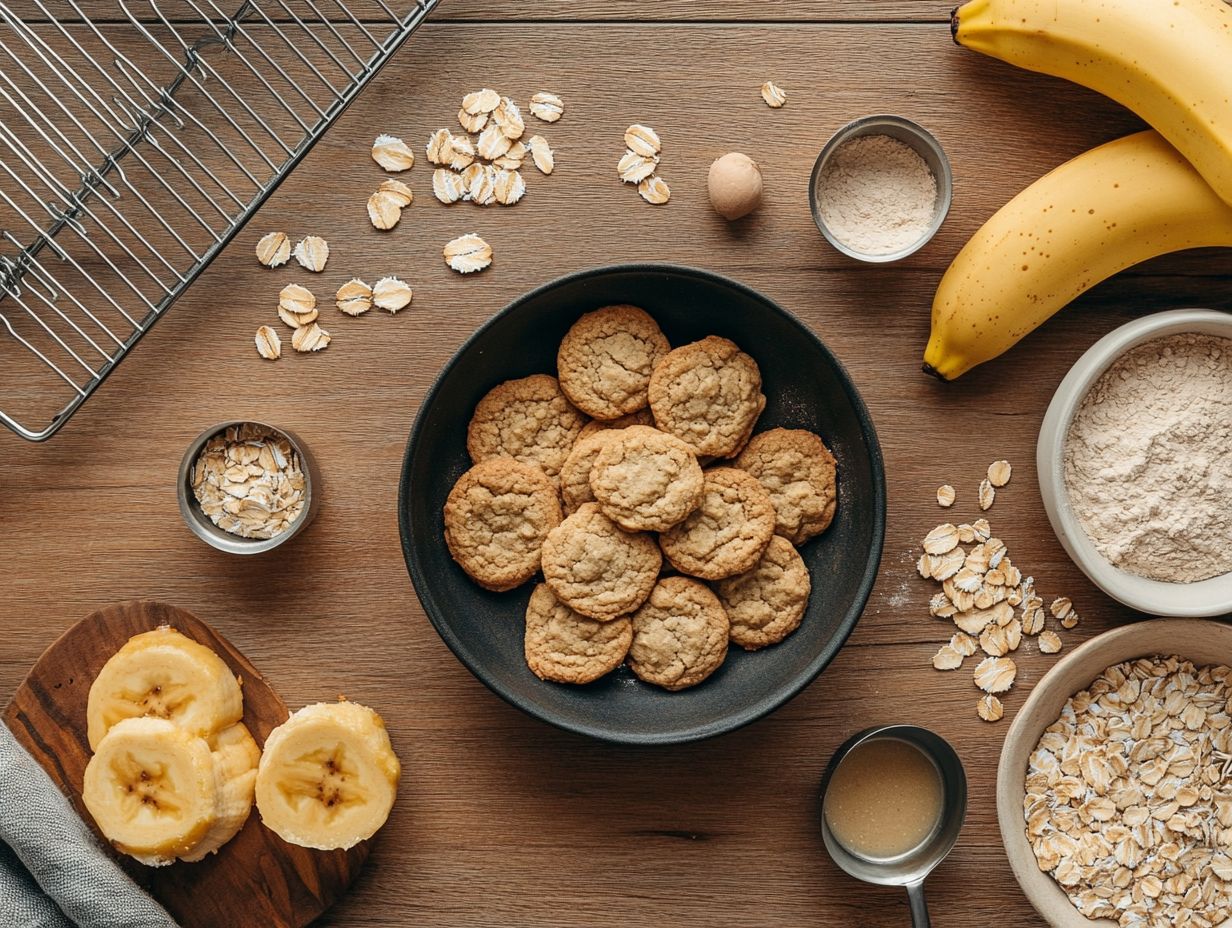
Substituting ingredients is essential when crafting plant-based cookies that cater to your specific dietary needs. This allows you to swap out traditional components for alternatives like flaxseed instead of eggs, almond butter in place of nut butter, and date sugar instead of granulated sugar, making healthy desserts.
This transformative approach not only accommodates various dietary restrictions, such as veganism and gluten intolerance, but it also elevates the nutritional profile of your baked creations. For example, using applesauce as a substitute for oil adds moisture while cutting back on fat content, resulting in lighter cookies. Similarly, aquafaba, the liquid from canned chickpeas, can be whipped to create a delightful fluffy texture, making it an ideal egg replacement. For more tips on healthy baking, check out this guide to plant-based cookies.
By exploring these substitutions, you can savor the rich flavors and textures of traditional cookies while staying true to your health-conscious choices.
3. Tips for Baking Plant-Based Cookies
When you re baking plant-based cookies, there are a few essential tips that can truly elevate your final product. Pay close attention to the consistency of your cookie dough, keep a vigilant eye on your cook time, and don t underestimate the power of a cooling rack for achieving the perfect texture.
It s vital to strike the right balance with your dough, ensuring it s neither too sticky nor too dry, as this will directly impact how your cookies spread during baking. Don t shy away from experimenting with different baking durations; ovens can vary quite a bit, and just a slight adjustment in time can lead to that ideal combination of crisp edges and a chewy center.
Once your cookies are out of the oven, letting them cool on a rack is a game changer. This simple step prevents sogginess by enhancing air circulation around each cookie, helping them maintain that delightful texture. These nuanced adjustments may seem small, but they can significantly elevate the overall quality of your plant-based treats.
Delicious Plant-Based Cookie Recipes for Special Diets
Indulge in an array of exquisite plant-based cookie recipes tailored for special diets, designed to satisfy a diverse range of tastes and preferences. You’ll find delightful options such as:
- vegan chocolate chip cookies
- gluten-free oatmeal raisin cookies
- paleo almond butter cookies
Each one a testament to the fact that you can enjoy mouthwatering flavors without any compromise.
1. Vegan Chocolate Chip Cookies
Vegan chocolate chip cookies are a timeless favorite that everyone can savor, crafted with plant-based ingredients and rich chocolate chips to create a truly satisfying indulgence. These healthy snacks can fit into any meal plan, ensuring your cookie craving is met with wholesome goodness.
These delightful cookies are not only simple to prepare, but they also cater beautifully to those embracing a vegan lifestyle, demonstrating that delectable desserts can thrive without eggs or dairy, making them ideal as a vegan dessert or portable vegan dessert.
To embark on this culinary journey, gather the following ingredients:
- 1 cup of almond flour
- 1 cup of whole wheat flour
- 1/2 cup of coconut sugar
- 1/2 teaspoon of baking soda
- 1/4 teaspoon of salt
- 1/3 cup of melted coconut oil
- 1/3 cup of maple syrup
- 1 cup of non-dairy chocolate baking chunks
Begin by mixing the dry and wet ingredients separately, then unite them in harmonious bliss, gently folding in the non-dairy chocolate chips. Once your dough is perfectly blended, scoop tablespoons onto a baking sheet lined with parchment paper.
Bake these treasures at 350 F for 10-12 minutes, until they turn a delightful golden brown. Allow them to cool for a few moments before you dive in and relish the warm, gooey goodness!
2. Gluten-Free Oatmeal Raisin Cookies
Gluten-free oatmeal raisin cookies offer a wholesome and delightful experience for those avoiding gluten. With gluten-free rolled oats and sweet raisins, they deliver a chewy yet satisfying texture.
These cookies are not just a remedy for sweet cravings; they also boast healthy ingredients. They are an ideal treat for both kids and adults.
By incorporating almond flour and coconut sugar, these gluten-free gems take on a rich, nutty flavor. It beautifully complements the natural sweetness of the raisins.
Warm spices such as cinnamon and vanilla extract enhance the taste. Each bite proves that gluten-free baking can be enjoyable and flavorful.
Savor this classic dessert without compromise!
3. Paleo Almond Butter Cookies
Paleo almond butter cookies are a refreshingly simple treat that aligns perfectly with your paleo principles. By using almond butter and natural sweeteners, you can enjoy a flavorful cookie experience.
These cookies also satisfy your sweet cravings while maintaining a healthy balance. They are a preferred choice for anyone committed to clean eating.
With ingredients such as almond flour, which is lower in carbs and higher in healthy fats than traditional flour, and pure maple syrup or honey, these cookies offer a perfect blend of taste and nutrition.
The inclusion of eggs binds the mixture and boosts the protein content. Each bite is both wholesome and satisfying.
Enjoy these cookies without straying from your dietary goals. They are a delightful option for paleo enthusiasts and anyone seeking a guilt-free snack.
4. Nut-Free Sunbutter Cookies
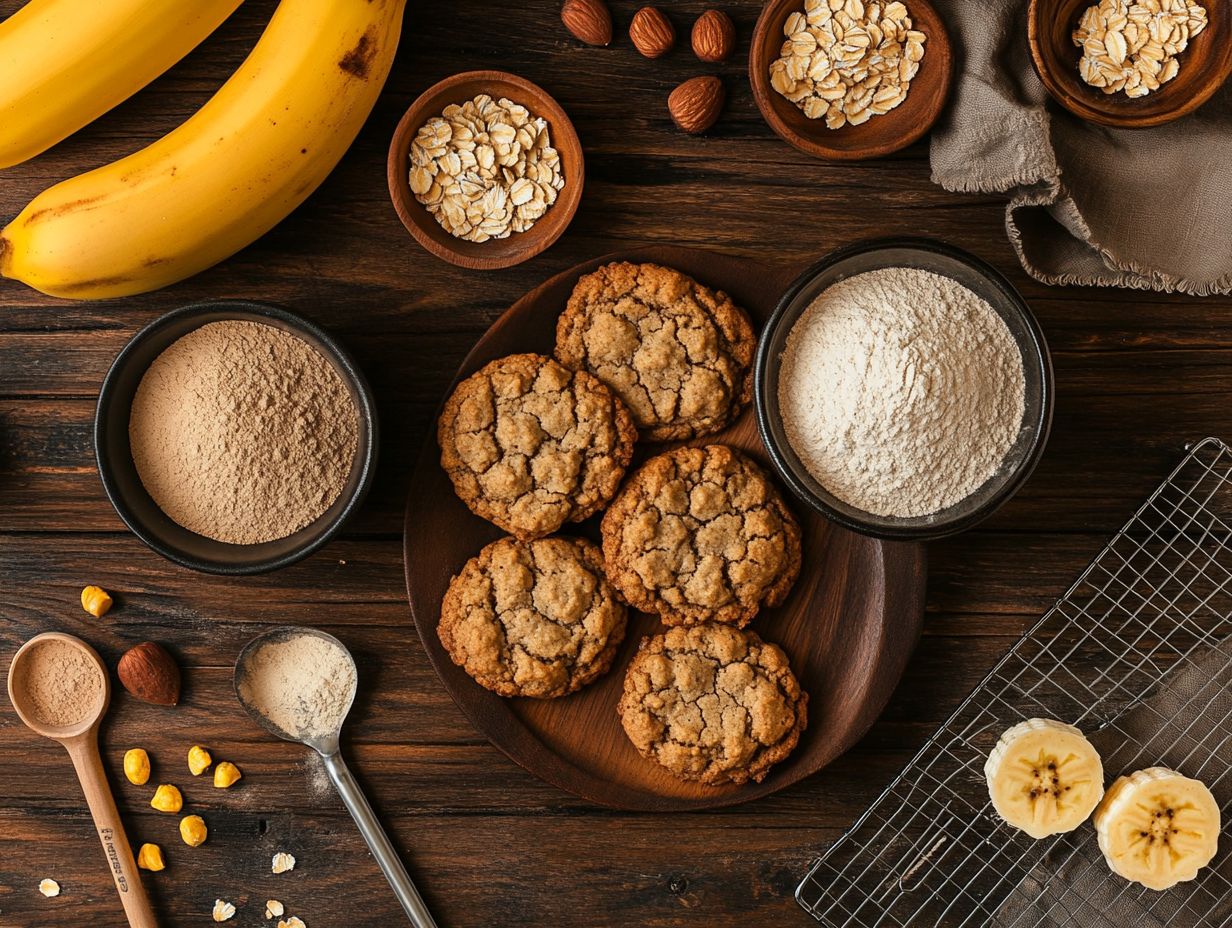
For a unique twist, try making Everything Cookies with a variety of add-ins that cater to all tastes.
Nut-free sunbutter cookies offer a delightful and safe alternative for those with nut allergies. They use sunflower seed butter to deliver a rich flavor without the risks associated with nuts.
These cookies are perfect if you’re looking for a healthy dessert to satisfy your cookie craving. They ensure that those who need to avoid nuts can still enjoy a delicious cookie experience.
To whip up these cookies, gather the following ingredients:
- 1 cup of sunflower seed butter (alternatively, use another nut butter if you don’t have nut allergies)
- 1 cup of brown sugar
- 1 egg
- 1 teaspoon of vanilla extract
Start by preheating your oven to 350 F. Line a baking sheet with parchment paper. In a mixing bowl, blend the sunflower seed butter, brown sugar, egg, and vanilla until harmoniously combined.
Scoop tablespoon-sized portions of dough onto the prepared sheet, spacing them about two inches apart. Bake for 10 to 12 minutes until they turn a lovely golden brown.
Let them cool, then dive in and enjoy every delightful, nut-free bite!
5. Dairy-Free Snickerdoodles
For a more adventurous option, discover the joy of Cowboy Cookies filled with whole food goodness, like oats, chocolate, and nuts.
Dairy-free snickerdoodles present a delightful twist on the classic cookie, utilizing plant-based ingredients to achieve that soft and chewy texture, all while being generously coated in a sweet cinnamon sugar topping. These homemade cookies are perfect for chocolate lovers and those who enjoy comfort food.
These scrumptious cookies offer a wonderful option for anyone craving a nostalgic treat without any dairy. They are perfect for gatherings or as a well-deserved personal indulgence.
To capture that iconic flavor, you ll only need a handful of simple ingredients, including all-purpose flour, baking soda, and a mix of common spices. These soft cookies will delight anyone who takes a bite.
Adding almond or coconut milk ensures each cookie maintains its moisture, and a generous sprinkle of cinnamon sugar delivers the signature sweetness in every bite. These cookies are a perfect addition to any dessert recipe collection.
By following a few straightforward steps, you’ll find yourself with a batch of delicious cookies that everyone can enjoy, regardless of their dietary restrictions. If you’re looking for a delightful option, check out how to make chewy plant-based cookies at home. From healthy cookies to everything cookies, there are options for everyone.
Frequently Asked Questions
What is a plant-based diet?
A plant-based diet is one that mainly consists of foods that come from plants, such as fruits, vegetables, whole grains, legumes, nuts, and seeds. It excludes or minimizes animal products like meat, dairy, and eggs. This makes it perfect for creating healthy desserts like plant-based cookies.
Making plant-based cookies for special diets can provide a delicious and healthy alternative for those who have dietary restrictions or preferences, such as vegetarians, vegans, and those with food allergies or intolerances. Whether it’s gluten-free cookies or oatmeal cookies, there are options for every cookie craving.
Common substitutes for ingredients in plant-based cookies include using flaxseed or chia seeds as egg replacements, using plant-based milk instead of dairy milk, and using coconut oil or vegan butter instead of regular butter. For sweetness, date sugar and banana are excellent choices.
Yes, plant-based cookies can be made gluten-free by using gluten-free flour and other alternative ingredients like almond meal. It is important to check all ingredients for potential allergens and cross-contamination, especially for those with celiac disease. Try using gluten-free rolled oats for added texture.
Absolutely! Plant-based cookies can still have a delicious and satisfying texture and flavor. Experiment with different ingredients and techniques, such as using nut flours or adding spices and extracts, to find what works best for you. For example, almond butter can provide a rich taste, and chocolate chips or dried fruit like cranberries can add extra flavor.
Yes, there are many simple and beginner-friendly plant-based cookie recipes available online. Look for recipes with a short list of ingredients, like chocolate chip cookies or breakfast cookies, and straightforward instructions. Don’t be afraid to try new things and have fun with it! Tools like a good mixing bowl and food processor can make the process easier.
Try making these cookies today and share your delicious results with us!

